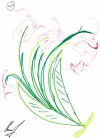"I Have No Hope": The Experience of Mothers in Polygamous Families as Manifested in Drawings and Narratives
- PMID: 33365005
- PMCID: PMC7750426
- DOI: 10.3389/fpsyg.2020.608577
"I Have No Hope": The Experience of Mothers in Polygamous Families as Manifested in Drawings and Narratives
Abstract
Polygamy is associated with lower marital satisfaction and is known to involve sexual, physical, and emotional abuse on the part of the husband. Less is known about the experience of mothers in polygamous families. This study was designed to shed light on the experiences of women in polygamous families in a sample of 80 Israeli Arab mothers living in polygamous families who use social services, domestic violence agencies, and health centers. Mothers were asked to draw their experiences in their families and to provide narratives for the drawings. A phenomenological approach was used to analyze the drawings, and yielded five different pictorial phenomena: (1) pseudo-sweetness, (2) houses, (3) the absentee father and the estranged mother, (4) incorporation of graphic symbols and lettering that represented distress, and (5) growth and development. Most of the drawings were restricted and shallow, indicating a complex emotional state of despair and distress. The central feelings that emerged from the drawings were negative emotions of anger, sadness, loneliness, and powerlessness. While some women longed for romantic relationships with their husbands, others expressed the desire for revenge and justice. Dissociation and parentification, as central coping strategies, emerged from the drawings and the narratives. The findings are discussed theoretically and clinically.
Keywords: drawings; internal distress; mothers; polygamous families; rejection.
Copyright © 2020 Gadban and Goldner.
Conflict of interest statement
The authors declare that the research was conducted in the absence of any commercial or financial relationships that could be construed as a potential conflict of interest.
Figures










Similar articles
-
The Experience of Mothers from the Israeli Jewish Ultra-Orthodox Sector after Disclosure of Their Child's Sexual Abuse as Manifested in Drawings and Narratives.J Child Sex Abus. 2022 Jan;31(1):86-104. doi: 10.1080/10538712.2021.1918307. Epub 2021 May 5. J Child Sex Abus. 2022. PMID: 33947316
-
Stressful life experience of the first married women in polygamous families in Gedeo zone, South Ethiopia: a qualitative study, 2021.BMC Psychol. 2022 Feb 22;10(1):40. doi: 10.1186/s40359-022-00753-4. BMC Psychol. 2022. PMID: 35193677 Free PMC article.
-
Perceptions of Child Abuse as Manifested in Drawings and Narratives by Children and Adolescents.Front Psychol. 2021 Jan 14;11:562972. doi: 10.3389/fpsyg.2020.562972. eCollection 2020. Front Psychol. 2021. PMID: 33519578 Free PMC article.
-
Malnutrition and gender relations in Western Kenya.Health Transit Rev. 1991 Oct;1(2):171-87. Health Transit Rev. 1991. PMID: 10148660 Review.
-
[The information of the schizophrenic patient: actuality].Encephale. 2005 Mar-Apr;31(2):227-34. doi: 10.1016/s0013-7006(05)82389-9. Encephale. 2005. PMID: 15959449 Review. French.
Cited by
-
Sharing Your Husband: Adult Attachment Styles and Emotional Responses of Israeli Bedouin-Arab Women to Potential Polygynous Marriage.Int J Environ Res Public Health. 2024 Sep 26;21(10):1281. doi: 10.3390/ijerph21101281. Int J Environ Res Public Health. 2024. PMID: 39457254 Free PMC article.
References
-
- Al-Krenawi A. (2001). Women from polygamous and monogamous marriages in an out-patient psychiatric clinic. Transcult. Psychiatry 38 187–199. 10.1177/136346150103800203 - DOI
LinkOut - more resources
Full Text Sources

